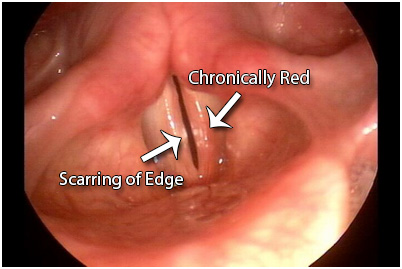- Question: How do the ingredients in e-cigarettes and vaporizers affect respiratory health? - August 16, 2019
- Bad Technique and Vocal Injury - January 9, 2019
- Is Edible Marijuana Dangerous for the Voice? Myths Dispelled - December 18, 2018
- Surprise! You have a hemorrhage - January 31, 2018
- Graves’ Disease: Treatment Overview - September 25, 2017
- Adele and the Stigma of Vocal Injury - July 11, 2017
- Vocal Curbside Consult: How does the thyroid affect the voice? - May 16, 2017
- Vocal Curbside Consult: How do hormones affect the voice? - May 3, 2017
- Vocal Curbside Consult: How do emotion and stress affect the voice? - April 17, 2017
- Vocal Curbside Consult: Vocal Recovery After Illness - April 7, 2017
Does talking a lot for my work risk damaging my voice?
Question: I work as a receptionist for a very busy office. This involves answering phones, making phone calls, and interacting with people at the front desk. By the end of the day, I’m often hoarse and my voice feels painful. Even if I am not hoarse, I notice that it is hard for me to socialize in louder environments after work because my voice is tired. Is this just a normal effect of a vocally-demanding job or am I injuring myself?

Answer: Vocally-demanding jobs, such as reception, retail, and teaching, often result in voice problems due to vocal cord damage.
The voice users usually do not have a singing or voice background. Speaking for 8-10 hours a day is very challenging, even for a singer. However without a vocal background, this is even more difficult.
Unfortunately, most receptionists, teachers, customer service representatives, and others in vocally-demanding jobs come to expect hoarseness and voice fatigue. These people often do not come to medical attention because their hoarseness is better after resting for a night. What they do not realize is that hoarseness is a sign that they are not using their voice correctly and that damage is occurring. Over a period of time, this usually results in irreversible damage and vocal difficulties that may limit their ability to do their job.
As an example, if that same person were to run every day, and found that after their run, their knee hurt every time, they would seek attention because while you expect your muscles to be tired, you do not expect knee pain. Hoarseness should be thought of as knee pain, not a sore muscle. It indicates something is not working right, not simply overworked, and medical attention is necessary.
Treatment may be as simple as voice training. In cases where there is already damage, vocal strategies to limit the stress on the voice may need to be implemented.
Daily hoarseness is not normal and should be addressed by a voice doctor.
Key Points
- Daily hoarseness related to work is not normal and indicates that damage is potentially occurring.
- A voice doctor can help to determine if damage has occurred and develop a treatment plan to help reverse damage and prevent future damage.
Video:
Stroboscopy of stiff edges vs. a normal exam
Read patient stories about Dr. Reena Gupta from The Division of Voice at the Osborne Head and Neck Institute.
To learn more about Dr. Reena Gupta, click here.




